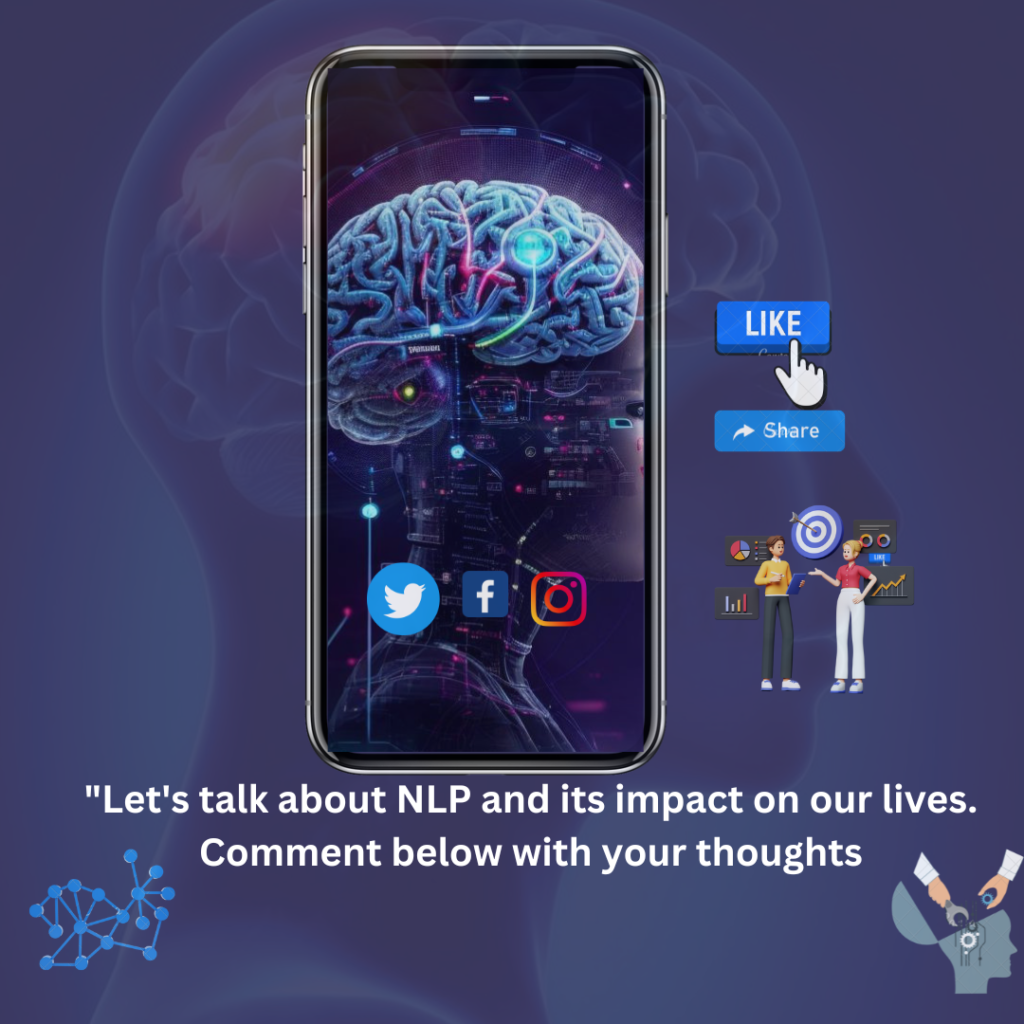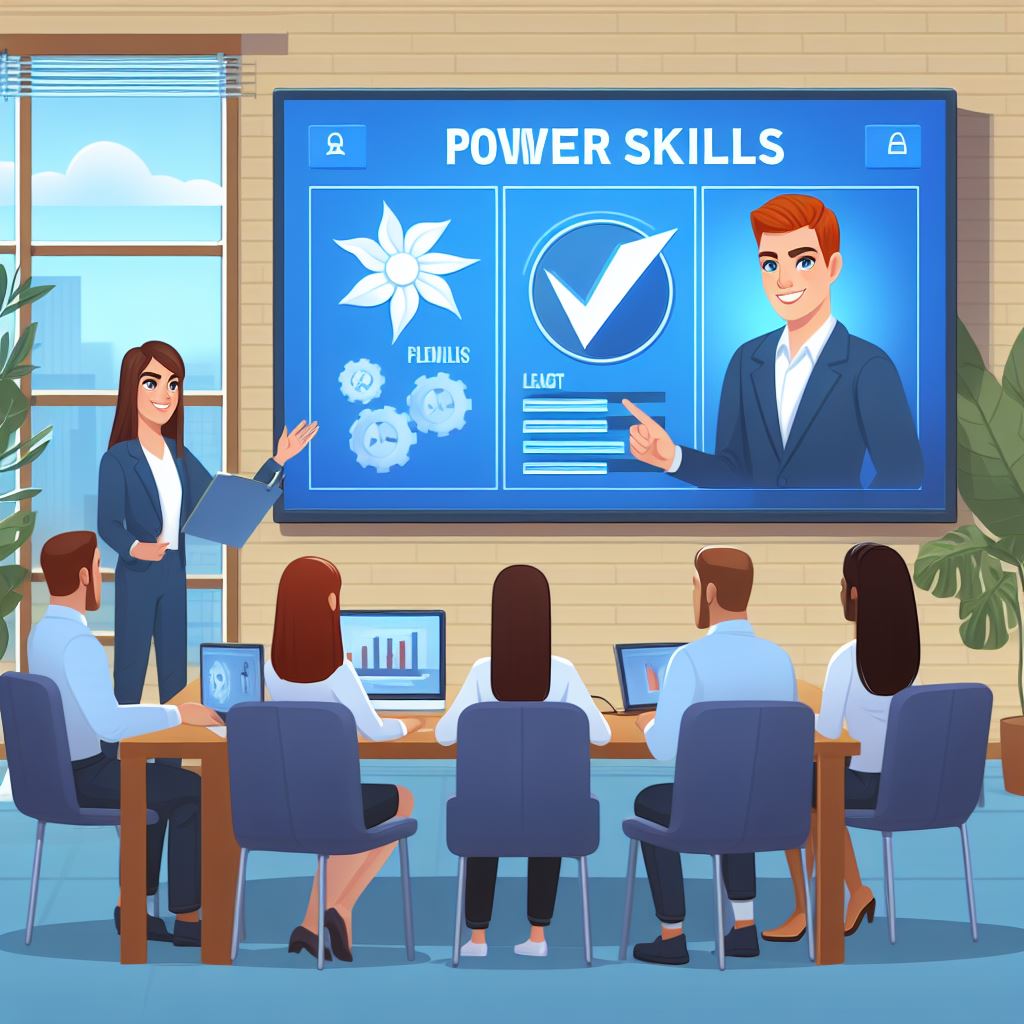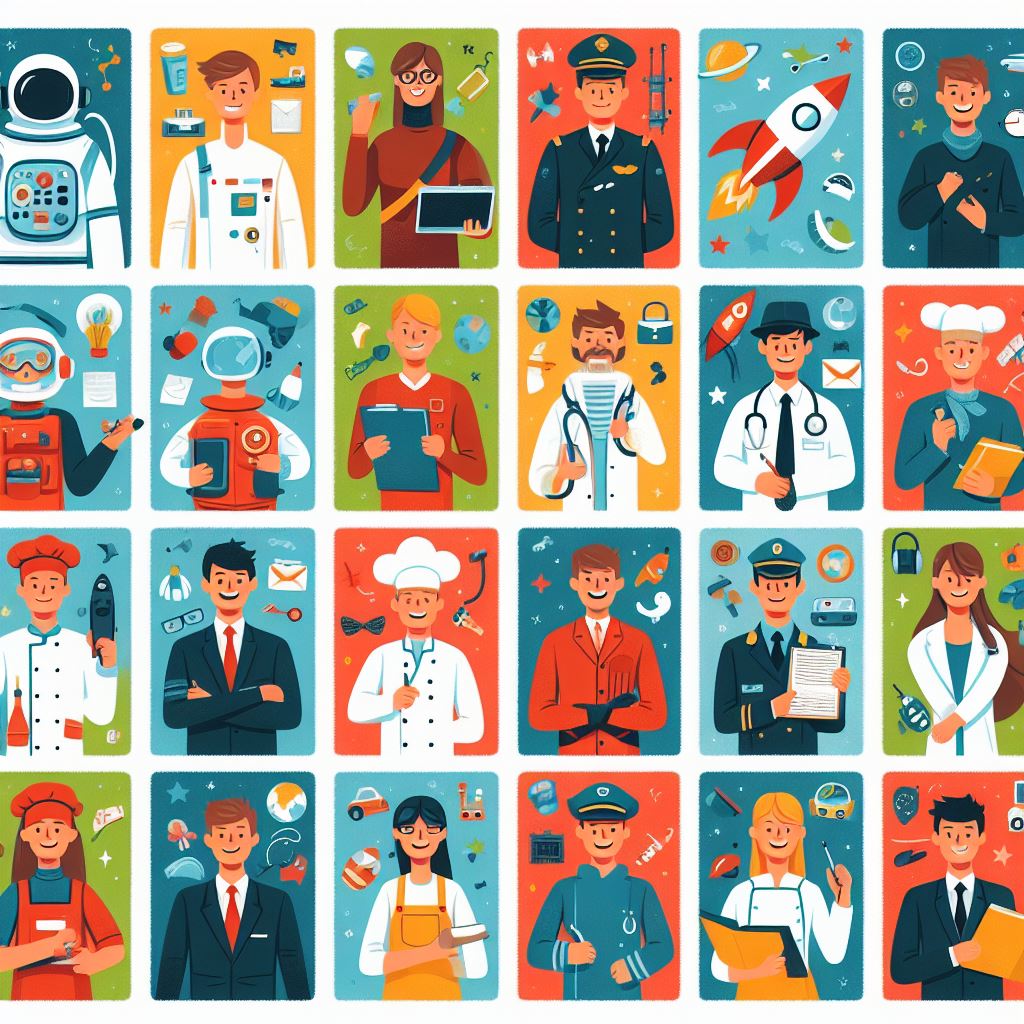What is NLP?
Natural Language Processing (NLP) is like a wizard’s spellbook for computers. It teaches them how to understand and talk like humans. Imagine your favorite chatbot or voice assistant—NLP is the magic behind their conversational skills!
Principles of NLP
- Language Decoding: NLP helps computers decode our words, whether typed or spoken. It’s like teaching a robot to read your mind (well, almost).
- Understanding Context: NLP doesn’t just look at individual words; it considers the whole sentence. Imagine if you said, “I love pizza,” and the computer thought you were confessing your love for Italy! NLP prevents such mix-ups.
- Semantic Sorcery: NLP figures out the meaning behind words. For example, it knows that “hot dog” isn’t a canine with a fever—it’s a tasty snack!
- Text Generation Tricks: Ever seen AI write poetry or news articles? That’s NLP in action. It’s like giving a computer a pen and saying, “Compose a sonnet, my silicon friend!”
- Chatbot Charisma: NLP powers chatbots that chat back. They’re like digital buddies who listen, understand, and reply. Some even tell jokes!
- Detecting Drama: NLP spots emotions in text. If someone types “I’m so sad,” it won’t suggest throwing a party. Instead, it’ll offer virtual tissues.
- Language Diversity: NLP handles different languages, accents, and slang. It’s like a multilingual chameleon. Bonjour, hola.
- Remember, NLP isn’t perfect. Sometimes it thinks “banana” means “Mount Everest” (not really, but you get the idea). Still, it’s a magical toolbox that makes our digital lives more interesting!
- So next time you chat with a bot or ask Siri for cat memes, give a nod to NLP—it’s the language whisperer behind the scenes!
Practical applications of NLP neuro linguistic programming
1. Chatbots: Your Digital BFFs
Imagine you’re feeling a bit down after a tough day at school. You open your favorite app, and there it is—a friendly chatbot asking, “Hey, how can I make your day better?” These chatbots use NLP to understand your feelings, offer advice, and even crack a joke. They’re like the cool older sibling who always has your back. 🤖👋
Example: “Hey, Chatbot, I’m stressed about my math test.” Chatbot: “No worries! Take a deep breath. Math is like solving puzzles. You’ve got this!”
2. Social Media Filters: The Emoji Whisperers
Gen-Z and Gen-Alpha are the emoji masters! 🙌 But sometimes, we need filters to keep our online vibes positive. NLP helps social media platforms filter out hate speech, cyberbullying, and negativity. So when you post that cute puppy pic, NLP ensures the comments are all heart eyes and paw prints. 🐶❤️
Example: “Ugh, this outfit is so last season.” NLP Filter: “Rock that retro vibe! You’re a fashion icon!”
3. Smart Study Aids: Your Brain’s Sidekick
Academic pressure? We’ve all been there. NLP-powered study apps analyze your notes, highlight key concepts, and even quiz you on tricky topics. It’s like having Hermione Granger whispering study tips in your ear. 📚🔍
Example: “What’s the capital of Uzbekistan?” NLP Study App: “Tashkent! You’re acing geography!”
4. Dating Apps: Cupid’s NLP Arrows
Building relationships in the digital age? NLP helps dating apps find your perfect match. It deciphers your profile, understands your interests, and suggests potential soulmates. Swipe right for love! 💖
Example: “Looking for someone who loves indie music and avocado toast.” NLP Matchmaker: “Meet Alex—the ultimate avocado aficionado!”
5. Stress-Busting Affirmations: Your Inner Cheerleader
Life gets overwhelming, right? NLP apps send you positive affirmations when you need them most. They’re like little pep talks from a wise old owl. 🦉
Example: “I’m failing this chemistry test.” NLP Affirmation: “You’re learning and growing. You’ve got this!”
6. Voice Assistants: Your Digital Genie
“Hey, Siri! What’s the weather today?” NLP-powered voice assistants understand your voice commands, weather updates, and even tell jokes. They’re like magical genies granting your wishes (minus the flying carpet). 🌤️🗣️
Example: “Tell me a joke, Alexa!” NLP Assistant: “Why did the computer go to therapy? Because it had too many bytes of emotional baggage!”
Remember, NLP isn’t just tech jargon—it’s the secret sauce making our digital lives smoother, kinder, and more fun! So next time you type, talk, or swipe, give a nod to the language wizards behind the screen. 🪄🌐
Ethical considerations
The Ethical Spellbook: Why NLP Matters
Natural Language Processing (NLP) is like a wand that turns words into actions. But like any powerful spell, it comes with responsibilities. Here’s why using NLP ethically matters:
Respecting Consent and Autonomy
Imagine if NLP could read your mind without permission. Scary, right? Well, it can’t (phew!), but it does analyze your texts, emails, and voice commands. So, respecting consent—whether it’s a chatbot or a language model—is crucial. No one wants their secrets spilled by a digital confidante! 🤐
Avoiding Persuasion Overload
NLP can nudge decisions. Imagine an app saying, “Buy those sneakers!” every time you scroll. Ethical NLP ensures persuasion isn’t pushy. It’s about nudging gently, like a friend suggesting dessert after dinner. 🍰
Transparency and Explainability
Ever felt puzzled by an AI’s decision? Ethical NLP provides explanations. If it says, “You got rejected because of your cosmic aura,” you’d want to know why! Transparency builds trust. 🌌
The NLP Dragon’s Lair: Limitations and Risks
NLP isn’t all rainbows and unicorns. It has its dragon-sized challenges:
Contextual Quicksand
Words change meaning based on context. Take “run”: jogging, managing, or escaping? NLP sometimes slips on this banana peel. It’s like a GPS saying, “Turn left at the next left.” 🙃
Synonym Shenanigans
NLP juggles synonyms. But “tiny” isn’t always “little.” Imagine a recipe app saying, “Add a minuscule pinch of salt.” You’d end up with ocean-flavored cookies! 🌊🍪
Irony and Sarcasm Snares
NLP struggles with irony. Imagine it analyzing this: “Great job, Einstein!” It might think you’re praising its relativity skills. 🧠⚛️
False Memory Potions
NLP can create false memories. It’s like telling your brain, “Remember that time you rode a unicorn?” Suddenly, you’re convinced it happened! 🦄🧠
Expectation Enchantments
NLP isn’t Dumbledore—it won’t magically solve all problems. Unrealistic expectations lead to disappointment. So, don’t expect it to predict your crush’s feelings. It’s not Cupid! 💔
Bias Broomsticks
NLP learns from data. If the data is biased, so is NLP. It’s like teaching a parrot to repeat only one side of a debate. Ethical NLP sweeps away bias. 🧹
3. The Quest for Responsible NLP
As NLP wizards, let’s wield our powers wisely. Use NLP for good, not mischief. And remember, even in the digital realm, ethics matter more than invisibility cloaks! 🌐✨
NLP techniques for personal growth
Anchoring: Your Emotional GPS
Imagine having a magical button that instantly transports you to a state of confidence, calmness, or courage. That’s anchoring! Here’s how it works:
- Step 1: Recall a moment when you felt powerful (maybe acing a test or scoring a goal).
- Step 2: While reliving that memory, press an imaginary button (yes, like a wizard).
- Step 3: Repeat this process a few times until your brain associates that feeling with the button.
Now, whenever you face an obstacle—poof!—press your emotional button. Confidence floods in, and obstacles shrink like scared mice. 🐭💪
Reframing: The Art of Perspective Magic
Life serves us lemons, right? But what if we could turn them into lemonade? That’s reframing! Here’s the recipe:
- Step 1: Spot a negative thought (like “I’m terrible at math”).
- Step 2: Imagine it’s a photo. Now, change the filter. Maybe it’s “I’m learning math, and progress rocks!”
- Step 3: Voilà! You’ve reframed your mindset.
Suddenly, obstacles become stepping stones, and confidence blooms like wildflowers. 🌼📸
Modeling: Becoming a Character Collector
Imagine you’re assembling a superhero squad. Modeling is like recruiting their superpowers! Here’s how:
- Step 1: Observe someone awesome (a teacher, a friend, even Beyoncé).
- Step 2: Study their behaviors, beliefs, and attitudes.
- Step 3: Adopt what resonates. You’re now a mini-Beyoncé (minus the Grammy collection).
Whether it’s resilience, charisma, or ninja focus, modeling lets you borrow from the best. 🚀🌟
Visualization: Your Mind’s Movie Theater
Close your eyes. Imagine acing that interview, nailing that dance routine, or acing that exam. That’s visualization! Here’s the script:
- Step 1: Picture your success scene in vivid detail (the smell of victory, the high-fives).
- Step 2: Replay it daily, like binge-watching your favorite show.
- Step 3: Your brain thinks, “Hey, we’ve done this!” and boosts your confidence.
Obstacles? Pfft! You’ve already conquered them in your mind’s blockbuster movie. 🎥🌠
Why These Techniques Matter for Young Readers
- Overcoming Obstacles: Anchoring helps them face challenges with superhero confidence.
- Boosting Confidence: Reframing turns self-doubt into self-love.
- Enhancing Well-Being: Modeling lets them collect wisdom from role models.
- Goal Achievement: Visualization turns dreams into reality.
Careers in NLP
Engineer
Responsibilities: NLP Engineers play a role, in developing computer systems that can truly understand language. They specialize in creating chatbots, voice assistants and advanced language models.
Required Skills: Proficiency in programming languages like Python and Java as expertise in machine learning and linguistics.
To read more about NLP engineer as a career path, visit this link.
Researchers
Responsibilities: NLP Researchers dive into the ocean of language data. Their work involves developing algorithms to improve existing models and unraveling the mysteries surrounding communication.
Required Skills: Knowledge of machine learning techniques statistical analysis and a curious mindset.
Analysts
Responsibilities: NLP Analysts meticulously analyze text data like Sherlock Holmes solving mysteries. Their tasks include extracting insights from volumes of words through sentiment analysis and identifying emerging trends.
Required Skills: Proficiency in data wrangling techniques, expertise in data visualization coupled with a talent, for storytelling.
Scientists
Responsibilities: NLP Scientists effortlessly combine principles with a hint of enchantment while working on language focused projects. They delve into the uses of networks, embeddings and language models to create formulas (or rather algorithms).
Required Skills Proficiency, in learning techniques, comprehension of model architecture and a sprinkle of creativity.
Conclusion
Neuro Linguistic Programming (NLP) has become increasingly recognized as a tool, for professional growth and its importance continues to grow. It is essential for teenagers to grasp the principles of NLP and understand how they can apply them in their lives as they navigate the complexities of adolescence and prepare for their endeavors.
By exploring the principles of NLP young individuals can gain insights into how their thoughts, language and actions shape their experiences. Furthermore learning to utilize the power of NLP techniques empowers teenagers to effectively handle aspects of their professional lives.
Whether it involves improving communication skills setting and achieving goals managing stress or enhancing relationships NLP provides a toolkit for development and success. Embracing NLP as a teenager opens up a plethora of opportunities for self discovery and empowerment paving the way for a journey, into adulthood filled with purpose.
FAQs
1. What is NLP?
NLP stands for Natural Language Processing. It’s a field of AI concerned with enabling computers to understand and manipulate human language.
2. What are some real-world applications?
Applications include machine translation, chatbots, sentiment analysis, text summarization, spam filtering, and voice assistants like Siri and Alexa.
3. How does it work?
NLP involves various techniques like tokenization, stemming/lemmatization, part-of-speech tagging, named entity recognition, and using algorithms like machine learning to analyze and process language.
4. What are some popular libraries or tools?
NLTK, spaCy, TensorFlow, PyTorch, Hugging Face Transformers are some popular open-source libraries for NLP tasks.
5. Is it difficult to learn?
It depends on your background and specific goals. Basic NLP concepts can be grasped with effort, but advanced applications and research might require deeper knowledge of linguistics, computer science, and statistics.
6. What are the future prospects of NLP?
NLP is a rapidly evolving field with increasing applications across various industries. The future holds promise for even more sophisticated language understanding and generation capabilities.
7. Can NLP understand sarcasm or humor?
Understanding sarcasm and humor involves nuances and context beyond just words, which is an ongoing challenge for NLP. However, research is progressing towards better handling of figurative language.
8. Can NLP be used to write creative content like poems or stories?
NLP models can be trained to generate creative text formats, but the quality and coherence still vary. It’s not yet a replacement for human creativity, but it can be a helpful tool for inspiration.
9. What are the ethical considerations?
Bias in training data can lead to biased NLP models, raising concerns about fairness and discrimination. Additionally, the potential for misuse of NLP for manipulation or surveillance requires careful ethical considerations.
10. Where can I learn more about NLP?
There are many online resources, courses, books, and tutorials available. Check out libraries and tools documentation, educational platforms like Coursera or Udacity, and research papers for deeper dives.





